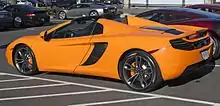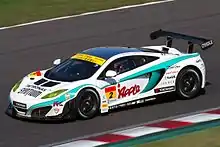McLaren 12C
The McLaren MP4-12C, later known simply as the McLaren 12C,[3] is a sports car that was designed and manufactured by McLaren Automotive. It was the first ever production car wholly designed and built by McLaren,[4] and their first production road car produced since the McLaren F1, which ended production in 1998. The car's final design was unveiled in September 2009 and was launched in mid-2011.
| McLaren 12C | |
|---|---|
%252C_30._August_2012%252C_D%C3%BCsseldorf.jpg.webp) | |
| Overview | |
| Manufacturer | McLaren Automotive |
| Production | 2011–2014 |
| Assembly | Woking, Surrey, England |
| Designer | Frank Stephenson |
| Body and chassis | |
| Class | Sports car (S) |
| Body style | 2-door coupé 2-door retractable hard-top convertible |
| Layout | Longitudinal, Rear mid-engine, rear-wheel-drive |
| Doors | Dihedral |
| Related | McLaren 650S McLaren P1 |
| Powertrain | |
| Engine | 3.8 L M838T twin-turbocharged V8 |
| Transmission | 7-speed dual-clutch |
| Dimensions | |
| Wheelbase | 2,670 mm (105.1 in)[1] |
| Length | 4,509 mm (177.5 in)[1] |
| Width | 1,908 mm (75.1 in)[1] |
| Height | 1,199 mm (47.2 in)[1] |
| Kerb weight | 1,434 kg (3,161 lb)[2] |
| Chronology | |
| Successor | McLaren 650S |
The MP4-12C uses a carbon fibre composite chassis, and is powered by a longitudinally-mounted McLaren M838T 3.8 L (3,799 cc) twin-turbocharged V8 engine, generating approximately 600 PS (592 hp; 441 kW) at 7,500 rpm and around 600 N⋅m (443 lbf⋅ft) of torque at 5,600 rpm. The car makes use of Formula 1-sourced technologies such as "brake steer",[5] where the inside rear wheel is braking during fast cornering to reduce understeer. Power is transmitted to the wheels through a seven-speed dual-clutch transmission manufactured by SSG. The entire drivetrain is the first to be entirely designed and produced in house by McLaren.
A convertible version of the car called the MP4-12C Spider, renamed the 12C Spider in 2012, was also available. In February 2014, McLaren announced the related 650S, with revised bodywork, upgraded engine and other technical improvements. In April 2014, McLaren announced the end of production of the 12C.[6]
Development
McLaren started developing the car in 2007 and secretly purchased a Ferrari 360 to use as a test mule. The mule called MV1 was used to test the 3.8-litre twin-turbocharged V8 engine. The car also featured side vents for additional cooling which were later incorporated in the final production model. Later in the year, the company purchased an Ultima GTR to test the braking system and suspension components, that mule was called the MV2. The space frame and body of that car were modified in order to accommodate the new components. Later, a third prototype was developed which was another Ferrari 360 dubbed the MV3 which was used to test the exhaust system. McLaren then built two prototypes themselves called CP1 and CP2 incorporating the Carbon Monocell monocoque which were used for testing the heat management system and performance. The final car was unveiled to the public on 9 September 2009 before the company's launch in 2010.[7]
Specifications

Design
In 2008, McLaren hired Frank Stephenson as design director for their reborn production car project.[8]
As with the McLaren F1, carbon fibre is used extensively in the vehicle to minimise weight. The MP4-12C weighs 1,301 kg (2,868 lb) dry.[9]
The chassis is based around a F1 style one-piece carbon fibre tub, called the Carbon MonoCell, weighing only 80 kg (176 lb). The MonoCell is made in a single pressing by using a set of patented processes, using Bi-Axial and Tri-Axial carbon fibre multiaxial fabrics produced by Formax UK Ltd. with the MonoCell manufactured by Carbo Tech in Salzburg, Austria.[10][11] This has reduced the time required to produce a MonoCell from 3,000 hours for the F1 and 500 hours for the Mercedes-Benz SLR McLaren, to 4 hours for the MP4-12C.[10]
The car has a conventional two side-by-side seating arrangement, unlike its predecessor the F1 which featured an irregular three seat formation (front centre, two behind either side). To make up for this, however, the car's central console is narrower than in other cars, seating the driver closer to the centre. Interior trim and materials can be specified in asymmetric configuration – known as "Driver Zone".
Suspension
The McLaren MP4-12C utilized a unique hydraulic configuration to suspend the vehicle as opposed to more traditional coil springs, dampers and anti-roll bars. What McLaren has called "ProActive Chassis Control," the system consists of an array of high and low pressure valves interconnected from both left to right and front to back, and the typical anti-roll bars were omitted entirely. When high pressure meets high pressure under roll conditions, stiffness results; and subsequently when high pressure meets low under heave and warp, more give is allowed, ultimately providing a firmer, competent suspension setup in spirited driving, and a very plush, compliant and comfortable ride when moving at slower, constant speeds. [12]
Engine
.jpg.webp)
The car was powered by the M838T 3.8 L; 231.8 cu in (3,799 cc) twin-turbo V8 engine, designed and developed by McLaren, Ilmor and Ricardo.[13] The design of the engine was based on a racing engine which was designed and developed by Tom Walkinshaw Racing for the IndyCar Series but never raced. However, other than the 93 mm (3.66 in) bore, little of that engine remains in the M838T.[14] It produces 600 PS (592 bhp; 441 kW) at 7500 rpm and 600 N⋅m (443 lbf⋅ft) of torque at 5600 rpm. It has a redline of 8,500 rpm, with 80% of torque available at just 2,000 rpm.[9][15] When first announced, McLaren claimed that it would have a higher horsepower to carbon dioxide emission ratio than any internal-combustion engine available at the time.[16]
McLaren announced a small number of improvements to become available in October 2012, with the option to be retrofitted to existing cars free of charge. The engine now produces 616 bhp (459 kW; 625 PS) and no change to the CO
2 emissions which remain at 279 g/km.[17] This power output has also become standard on the 2013 model.
The M838T engine is manufactured for McLaren at the Ricardo Shoreham Technical Centre in West Sussex.[13]
Transmission
%252C_30._August_2012%252C_D%C3%BCsseldorf.jpg.webp)
The engine is connected to a seven-speed automatic dual-clutch gearbox made by Graziano Oerlikon. Dubbed the "Seamless Shift Gearbox" or SSG, the gearbox features a system dubbed "Pre-Cog" that allows the driver to preselect the next gear by lightly tapping the paddle.[14][18]
Performance
DragTimes.com posted a YouTube video of a stock McLaren 12C accelerating from 0 to 60 mph in 2.8 seconds and from 0 to 100 mph in 6.0 seconds.[19] DragTimes.com also recorded a quarter mile time for the McLaren 12C of 10.27 seconds at 218 km/h (135 mph),[20] the 3rd fastest verified time for a stock production car at the time.
McLaren has claimed the vehicle's top speed to be 207 mph (333 km/h)[21] but a top speed of 346.6 km/h (215 mph) was achieved in the MP4-12C Spider, which is 3 mph "slower" than the coupe. The Coupe (in reality) can do 218.61 mph (352 km/h).[22] It can brake from 200 km/h (124 mph) to a complete stop in under 5 seconds.[23] Braking from 100 km/h (62 mph) to zero can be done in under 30 metres (98 ft), around seven car lengths.
2011 McLaren MP4-12C has a power to weight ratio of 2.39 kg (5.27 lb) per horsepower.
2013 McLaren 12C has a power to weight ratio of 2.29 kg (5.05 lb) per horsepower.
Naming convention
The name's former prefix 'MP4' has been the chassis designation for all McLaren Formula 1 cars since 1981. 'MP4' stands for McLaren Project 4 as a result of the merger between Ron Dennis' Project 4 organization with McLaren. The '12' refers to McLaren's internal Vehicle Performance Index through which it rates key performance criteria both for competitors and for its own cars. The criteria combine power, weight, emissions, and aerodynamic efficiency. The coalition of all these values delivers an overall performance index that has been used as a benchmark throughout the car's development. The 'C' refers to Carbon, highlighting the application of carbon fibre technology to the future range of McLaren sports cars.
MP4-12C shares its name with the MP4/12 Formula 1 car that raced in the 1997 season. This car featured a second brake pedal discovered by photographers to counter understeer on the exit of the corners by selecting the inside rear wheel, similar to the computer controlled "brake steer" system of the MP4-12C.
In the end of 2012, the name of the MP4-12C was reduced to 12C - that name is usually used when referring to the coupe. The open-top version now being called the 12C Spider.
Production
Produced at the new £50m McLaren Production Centre, which is located next to the existing award-winning McLaren Technology Centre in Surrey, the building is designed to serve as the future production site of McLaren Automotive's road cars. British Prime Minister David Cameron officially opened the building on 18 November 2011.[24]
All of the major components are produced by external contractors, with only final assembly, paint and inspection/shipping occurring at the McLaren Production Centre. Final assembly starts with the MonoCell, around which all components are then placed and fitted.
Reception
On 10 July 2011, the MP4-12C set the second fastest lap around Top Gear's test track, posting a time of 1 minute and 16.2 seconds.[25] The car was developed and tested by McLaren on the Top Gear test track as part of their product development, long before its appearance on the show. It was 1.1 seconds slower than the Ariel Atom 500 and 2.4 seconds slower than the Pagani Huayra.[26]
The MP4-12C lapped the Nürburgring in 7 minutes and 28 seconds.[27]
The MP4-12C won the Middle East "Car of the Year" Award as "Best Supercar" in 2012 and overall "Car of the Year" at the Middle East Motor Awards the same year.[28] [29]
Spider

The 12C Spider is a convertible version of the MP4-12C with a retractable hardtop. Because the coupe was designed from the outset with a convertible version in mind, no additional strengthening was needed for the Spider and it weighs only 40 kg (88 lb) more than the coupe.[30] McLaren has worked to keep the Spider's top speed 204 mph (328 km/h) close to the coupé's 207 mph (333 km/h) top speed and up to 196 mph (315 km/h) is possible roof down. Meanwhile, the dihedral doors of the coupé are retained.[31]
Motorsports
GT3

In December 2010, McLaren announced that they would produce a small number of MP4-12C cars in order for them to compete in the FIA Group GT3. McLaren stated that they would provide maintenance for the cars and begin racing in 2012 with the CRS Racing team.[32] The MP4-12C was the first car to compete in sportscar racing for the company since the F1 GTR.[33] It received its début with a single car entry for the Spa Francorchamps round of the British GT championship. This was followed by a three car entry in the 2011 Spa 24 Hours.[34] Another car was also entered in the GT cup of the 2011 Macau Grand Prix, driven by Danny Watts.[35]
In March 2012, McLaren readied 25 MP4-12C GT3 cars for a full racing season in the 2012 FIA GT1 World Championship, and its GT drivers tested the car on its Dunsfold test track, the same test track as used in the Top Gear BBC television show.[36] McLaren released several promotional videos for the MP4-12C in the lead up to the racing season, including one of Formula 1 star Lewis Hamilton driving the car at locations in the U.S.
Compared to the road car, the MP4-12C GT3 produces less power with only 493 bhp (368 kW; 500 PS) due to homologation. The car features a new bespoke six-speed gearbox that is 80 kg (176 lb) lighter than the road car's seven-speed, developed with Ricardo. The steering wheel is lifted from the McLaren MP4-24 Formula 1 car.[37]
The car took its first victories in the world at the two races of the Circuito de Navarra round of the 2012 FIA GT1 World Championship season being run by Hexis Racing.
Marketing
Tag Heuer produced a limited (1000 units) series of Carrera MP4-12C Chronograph wrist watch inspired by the MP4-12C sports car. The watch was unveiled in 2011 TAG Heuer Mastering Speed Exhibition at Halle Secheron in Geneva.[38][39][40]
References
- "McLaren 12C Specifications". Archived from the original on 15 June 2013. Retrieved 19 March 2014.
- "McLaren 12C Specifications PDF" (PDF). Archived from the original (PDF) on 18 March 2014. Retrieved 19 March 2014.
- "12C". McLaren. Archived from the original on 30 March 2014. Retrieved 5 August 2013.
- http://cars.mclaren.com/featured-articles/12c-five-years-on.html. Missing or empty
|title=(help) - "McLaren MP-12C:First Batch of details and images surface". Autoblog.
- Dobie, Stephen (4 April 2014). "McLaren 12C supercar discontinued". Evo. Retrieved 6 April 2014.
- Petrány, Máté (7 September 2016). "McLaren 12C, development". road and track. Retrieved 19 January 2018.
- Ireson, Nelson (8 August 2008). "McLaren hires Frank Stephenson as new design director". Motor Authority. Retrieved 22 March 2012.
- "McLaren MP4-12C First look". Edmunds.com. 13 October 2009.
- "McLaren MP4-12C – Full Specs Announced [Video]". Worldcarfans.com. Retrieved 23 November 2011.
- "Carbo Tech to produce carbon fibre monocoques for McLaren sports cars". Reinforced Plastics. 15 June 2010. Retrieved 23 November 2011.
- http://mp4-12c.over-blog.com/pages/Proactive-chassis-control-and-how-it-works-4755895.html. Missing or empty
|title=(help) - "New Ricardo engine assembly facility commences pilot production". ricardo.com. Retrieved 19 February 2011.
- "Car & Driver: 2012 McLaren MP4-12C Tech Trickledown". 1 February 2011. Retrieved 27 March 2011.
- "The Official McLaren Automotive Website". 3 February 2010. Archived from the original on 1 October 2009. Retrieved 3 February 2010.
- "McLaren MP4-12C – the first official P11 story". 8 September 2009.
- Tisshaw, Mark (7 June 2012). "Upgraded McLaren MP4-12C gets 616bhp". Autocar. Retrieved 8 June 2012.
- English, Andrew (14 February 2011). "McLaren MP4-12C review". The Daily Telegraph. London.
- "McLaren MP4-12C, 0-60 MPH in 2.8 Seconds Launch Control Demonstration on the Street". YouTube.com. 28 April 2013. Retrieved 15 October 2014.
- "2012 McLaren 12C Timeslip". dragtimes.com. 18 March 2014. Retrieved 19 March 2014.
- "McLaren 12C - Specification". mclaren.com. 1 January 2012. Archived from the original on 6 May 2015. Retrieved 15 October 2014.
- "McLaren MP4-12C Spider 0-346 km/h Top Speed Test sport auto". YouTube.
- "2011 McLaren MP4-12C Super Sports Car Hitting the US Market". arizonafoothillsmagazine.com. 6 May 2011. Retrieved 29 May 2012.
- "McLaren opens new £50 million factory… – BBC Top Gear". Topgear.com. 18 November 2011. Retrieved 23 November 2011.
- "Top Gear Power Laps". 10 July 2011. Retrieved 11 July 2011.
- "TopGear Stig Power Laps". BBC. 20 October 2008. Retrieved 20 July 2011.
- "MoterSport-McLaren MP4-12C : Nürburgring test".
- "McLaren 12C Named Middle East 'Car of the Year'". The Car Addict. Archived from the original on 8 December 2012. Retrieved 29 November 2012.
- "The McLaren 12C named Middle East 'Car of the Year'". zawya.
- Comer, Colin (January 2013). "No Roof, No Change, No Problem". Road & Track. 64 (5): 44–49.
- "McLarenAutomotive.com 12C Spider". McLaren Automotive. 3 July 2012. Retrieved 3 July 2012.
- "McLaren MP4-12C GT3 Announcement website". Mclarengt.com. Retrieved 19 February 2011.
- Elizalde, Pablo (17 December 2010). "McLaren MP4-12C to race from 2012". autosport.com. Haymarket Publications. Retrieved 18 December 2010.
- Phillip, Sam (20 April 2011). "McLaren MP4-12C GT3: a Top Gear exclusive". Retrieved 5 May 2011.
- "Qualifying". 19 November 2011. Retrieved 19 November 2011.
- "McLaren MP4-12C GT3 Top Gear Track Test Video And Racing Debut - Autos & Trends". Ibtimes.com. 29 March 2012. Retrieved 17 August 2012.
- "evo: McLaren MP4-12C GT3 racing car: new pictures and video". Retrieved 5 May 2011.
- KirGarlitos (23 December 2012). "Tag Heuer Carrera MP4-12C Chronograph". Top Speed.
- "The only official McLaren Store - McLaren Teamwear - McLaren Gifts - McLaren Accessories - McLaren Polo Shirts - McLaren Jackets - McLaren T-shirts - McLaren Headwear - McLaren Footwear - McLaren Books - McLaren DVDs - McLaren Accessories". mclarenstore.com.
- Noah Joseph. "TAG Heuer makes a watch worthy of the McLaren MP4-12C". Autoblog.